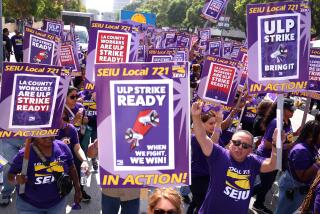MTA Talks Advance
- Share via
Momentum appears to be building in negotiations between the Metropolitan Transportation Authority and the mechanics union, whose members began a countywide transit strike last week.
Flush from meetings that stretched past 4 a.m. on Thursday, the two sides said they had agreed on 24 minor contract issues. Feeling confident that they were moving forward, they scheduled negotiations for today and Saturday and met again Thursday evening.
For the record:
12:00 a.m. Oct. 25, 2003 For The Record
Los Angeles Times Saturday October 25, 2003 Home Edition Main News Part A Page 2 National Desk 1 inches; 50 words Type of Material: Correction
Jack Kyser -- An article in Friday’s California section about MTA talks and an article in Thursday’s Section A about the impact of Disney Hall both misspelled the name of the senior vice president of the Los Angeles County Economic Development Corp. The economist’s name is Jack Kyser, not Keyser.
“About two-thirds of the issues that needed to be addressed have been signed off on,” said L.A. County Supervisor Zev Yaroslavsky, who chairs the MTA board. “That’s more progress than in a year and a half” of negotiations.
Neil Silver, president of the Amalgamated Transit Union, also reported movement.
“Maybe once you get in the habit of signing ‘yes,’ you get in the habit ... and you come to an agreement,” Silver said. “I guess that is the thinking.”
At the same time, however, both sides cautioned that the hard work was still ahead. Thursday’s progress, they said, was made on issues such as work rules; the more divisive issues of wages and health-care benefits had barely been broached.
Public transportation throughout the county ground to a halt when the Amalgamated Transit Union, which represents mechanics, called the strike just after midnight Oct. 14. Unions representing drivers, clerks and dispatchers walked out with the mechanics, and within hours, all MTA trains and buses were out of service.
The work stoppage, the second transit strike in L.A. in three years and the 10th since 1960, has stranded a half-million commuters and clogged traffic on some of the nation’s busiest roads and highways. Half of the patients scheduled to be seen at Olive View Medical Center in Sylmar, a county hospital, have canceled their appointments since the walkout began, and county health officials attribute most of the no-shows to the transit strike.
The mechanics had worked without a contract for more than a year when they walked off the job last week. The primary dispute involves health benefits. The union’s health-care trust fund is insolvent, and the MTA says that the union mismanaged it. The union says that the fund is losing $500,000 per month because the MTA doesn’t pay enough to cover the cost of care. The union has already agreed that members will pay about $71 per month toward their insurance policies, but under the MTA’s proposal that number could go up.
The MTA has offered no raises for the first year of the contract, but 2.5% increases for each of the next two years of the three-year agreement. However, the agency has agreed to pony up $4.7 million to make the health fund whole, and cover the $500,000 monthly deficit.
Despite the apparent optimism in the scheduling of talks into the weekend, the rhetoric on the MTA side actually heated up this week.
On Tuesday, the MTA began a $100,000 radio campaign in a bid to press its points with the public.
On Thursday, agency representatives phoned reporters to say that just after lunch local economist Jack Keyser would present a report showing that the strike had hurt the economy. At a press briefing at 1 p.m., Keyser said that the walkout was costing $4 million per day in lost wages and income. But later, MTA officials told The Times that the report had been prepared six months earlier, in anticipation of a strike, and that the Los Angeles County Economic Development Corp., of which Keyser is senior vice president, had been paid to prepare it.
“They called and said, ‘Can you come over and do this?’ ” Keyser said in an interview. Still, he said, the strike could hurt the region’s economy.
“I’m representing the economy of Los Angeles County,” he said, “not the MTA.”
Later in the day, Yaroslavsky criticized Silver, saying that internal politics had propelled the mechanics union president to call the strike. “I really don’t understand how one man’s political interest in union politics has held the entire county hostage,” Yaroslavsky said.
Moreover, the supervisor said, the MTA would not offer “one dime” more in health benefits or wages to the union.
He said the agency planned to stand firm in order to “change the culture at the MTA,” so that unions would not view striking as a viable alternative.
“You don’t win by striking against the MTA,” he said.
Times staff writer Daren Briscoe contributed to this report.
More to Read
Sign up for Essential California
The most important California stories and recommendations in your inbox every morning.
You may occasionally receive promotional content from the Los Angeles Times.














